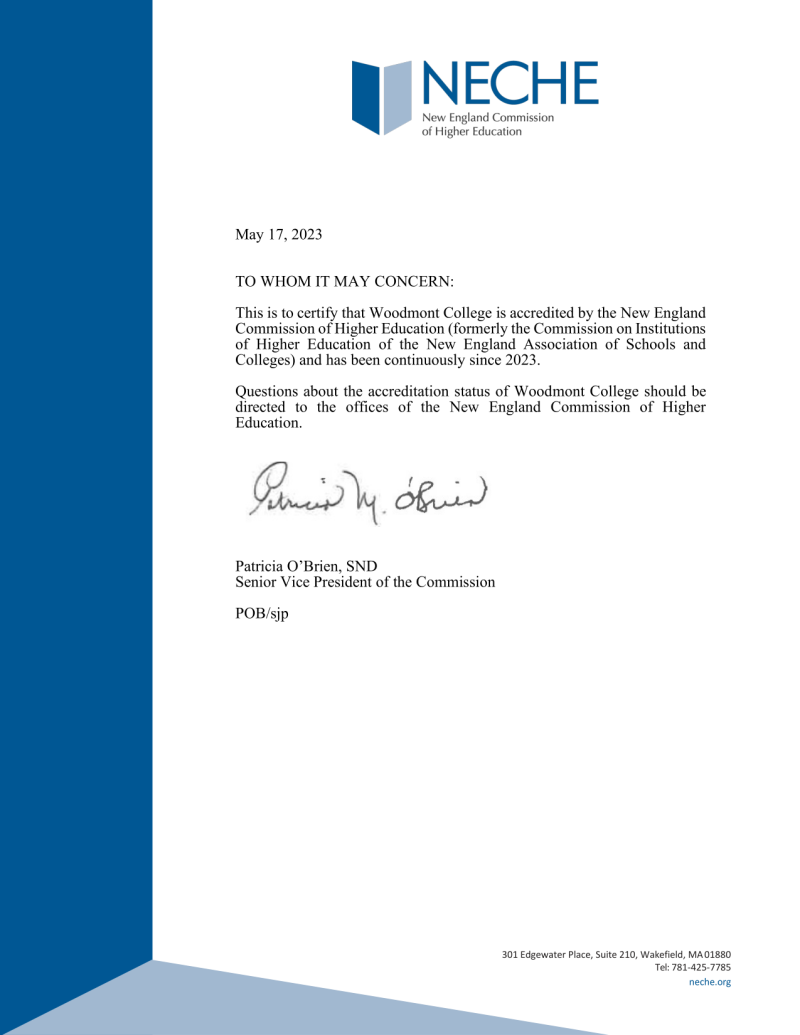Woodmont College was founded in 2011, achieved state licensure in 2012, and achieved institutional accreditation in 2018. In 2020, Woodmont College was reaccredited by the DEAC. In 2023, Woodmont College was awarded NECHE regional accreditation. Woodmont College is authorized in all 50 states of the United States.
Accreditation is a private, voluntary, non-governmental peer-review process that reviews the educational quality of an institution or program. In the United States, accreditation is the primary means of assuring educational quality. Accreditation status confirms that an institution has voluntarily undergone a comprehensive self-study and peer examination that demonstrates the institution meets standards of accreditation.
The New England Commission of Higher Education (NECHE) is a voluntary, non-governmental membership association that serves as a regional institutional accreditor and promotes educational excellence and quality assurance to its member institutions. NECHE members are degree granting post-secondary educational institutions offering higher education and located inside or outside the United States, including, but not limited to, the States of Connecticut, Maine, Massachusetts, New Hampshire, Rhode Island, and Vermont. NECHE currently accredits over 200 institutions across the globe.
Accreditation of an institution of higher education by the Commission indicates that it meets or exceeds criteria for the assessment of institutional quality periodically applied through a peer review process. An accredited college or university is one which has available the necessary resources to achieve its stated purposes through appropriate educational programs, is substantially doing so, and gives reasonable evidence that it will continue to do so in the foreseeable future. Institutional integrity is also addressed through accreditation.
Accreditation by the Commission is not partial but applies to the institution as a whole. As such, it is not a guarantee of every course or program offered, or the competence of individual graduates. Rather, it provides reasonable assurance about the quality of opportunities available to students who attend the institution.
Inquiries regarding the accreditation status by the Commission should be directed to the administrative staff of the institution. Individuals also may contact:
New England Commission of Higher Education
3 Burlington Woods Drive, Suite 100, Burlington, MA 01803-4514
(781) 425 7785
E-Mail: info@neche.org
NECHE is a leading regional accreditation body which currently accredits over 200 institutions across the globe. NECHE is recognized by the US Dept. of Education and CHEA.

Accreditation provides students, prospective students, and the general public with information about the quality of an institution or program. It is important to make sure that the institution will provide you the education program and preparation for the career you are choosing. Accreditation provides this assurance and information about an institution. It is very important to know the accreditation status of the institution and whether an individual program requires a special accreditation status within a specific profession. It is important to remember that institutional accreditation does not mean that an individual program is accredited (e.g., nursing, law, teaching, occupational therapy, veterinary medicine).

A national advocate and institutional voice for academic quality through accreditation, CHEA is a U.S. association of degree-granting colleges and universities and recognizes institutional and programmatic accrediting organizations. CHEA is the only national organization focused exclusively on higher education accreditation.
Woodmont College is licensed by the Florida Department of Education’s Commission for Independent Education since 2012.
The Commission for Independent Education has statutory responsibilities in matters relating to nonpublic, postsecondary, educational institutions. In keeping with the Florida Department of Education’s goal of producing a seamless educational system, some of these functions include consumer protection, program improvement, institutional policies and administration, data management, and the licensure of independent schools, colleges and universities.
Woodmont College has been approved by the State of Florida to participate in the National Council for State Authorization Reciprocity Agreements. NC-SARA is a voluntary, regional approach to state oversight of postsecondary distance education.
The State Authorization Reciprocity Agreements, commonly known as SARA, provides a voluntary, regional approach to state oversight of postsecondary distance education. When states join SARA, they agree to follow uniform processes for approving their eligible institutions’ participation. They also agree to deal with other states’ SARA institutions in a common way when those institutions carry out activities in SARA states other than their own.
The National Council for State Authorization Reciprocity Agreements, in collaboration with the four regional higher education compacts, was established to develop and implement an effective and efficient reciprocal state-level authorization process for postsecondary distance education. Its mission is to provide broad access to postsecondary education opportunities to students across the country, to increase the quality and value of higher learning credentials earned via distance education, and to assure students are well served in a rapidly changing education landscape.